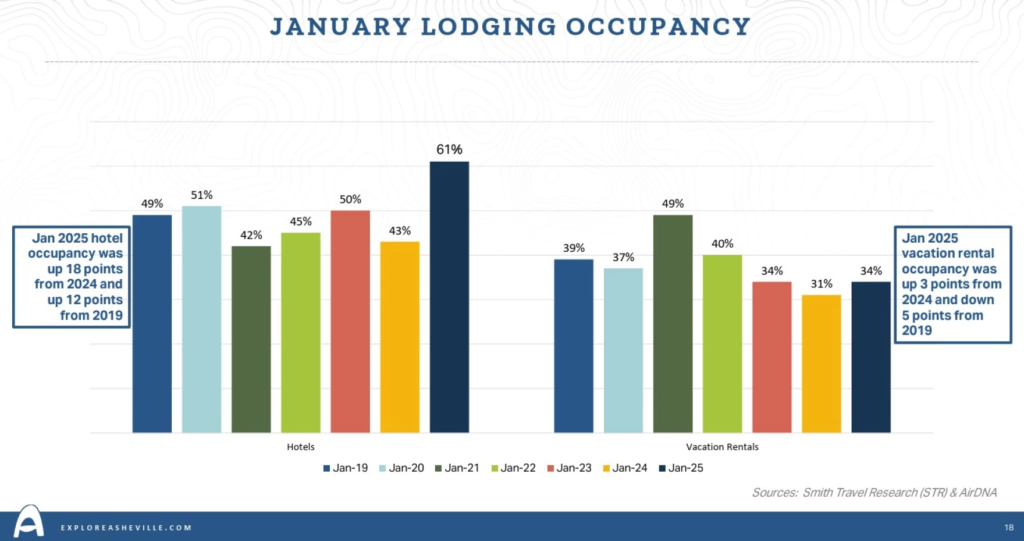Surge of recovery workers Buncombe hotels best-ever January for occupancy
WUNC February 27th, 2025
Buncombe County’s hospitality industry was hard hit by the drop in tourism after Hurricane Helene. But last month, hotels posted their best January ever — due in large part to long-stay corporate guests booking rooms as they work on disaster recovery and insurance claims in the area.
Vic Isley, president and CEO of the Buncombe County Tourism Development Authority, shared the news at the board’s monthly meeting Wednesday. Notably, she said, the bump was in large part due to hotel stays by individuals visiting the region for purposes other than tourism.
“So, what you’re starting to see here is impact in hotel [occupancy] for longer-stay corporate contracts, so State Farm insurance adjusters, contractors, construction,” Isley said.
Hotels across the region also have, for months, hosted thousands of guests who were displaced from home during Helene, with the Federal Emergency Management Agency (FEMA) paying for their stays.

A chart from a Buncombe TDA presentation Wednesday, Feb. 26, 2025.
Buncombe County’s hotel occupancy hit 61% in January — an increase of 18 percentage points from the same month last year and a 12-point increase over January 2019. The figure marks the highest hotel occupancy rate for any January since 1987, when local officials first began tracking the numbers. Over that time, the average January occupancy rate has been 40%, Isley said.
She noted that metrics from other disaster-hit areas, such as New Orleans, suggest that it won’t necessarily be smooth sailing for the industry going forward.
“We’re going to see these ups and downs as we go through the next couple of years, and this is the first month that we’re really seeing this shift,” she said.
Vacation rentals, also known as short-term rentals or STRs, did not fare as well as hotels. The January occupancy rate for STRs was 34% – up three percentage points from a year earlier and down 5 points from January 2019.
Isley said that overall, the numbers are “promising” news but that the region’s recovery remains “challenging still.”
Billy Strings gives Asheville’s economy a $16 million boost
The sold-out, six-show run by bluegrass artist Billy Strings in Asheville earlier this month didn’t just bring a wave of enthusiastic, tie-dye-clad fans – it also brought significant economic benefits to the city, TDA officials said Wednesday.
Strings’s shows at Harrah’s Cherokee Center drew 38,000 concert-goers from all 50 states, Puerto Rico and the United Kingdom, Isley said.

The performances resulted in nearly $16 million in direct spending, including about $6 million in lodging revenue and $3.5 million in food and beverage sales, she said. Food and beverage staff from the event took home $250,000 in direct wages and $40,000 in tips.
Several attendees at Wednesday’s meeting said the shows marked the first time downtown Asheville saw a surge of visitors since Hurricane Helene devastated the region in September.
Isley noted that the TDA has invested more than $7.2 million in Harrah’s Cherokee Center and its ExploreAsheville.com Arena over the years.
“We’re happy to say Billy’s going to be coming back next year,” she said. “Can’t divulge any of the details around that, but we are super thankful for his love of Asheville.”
